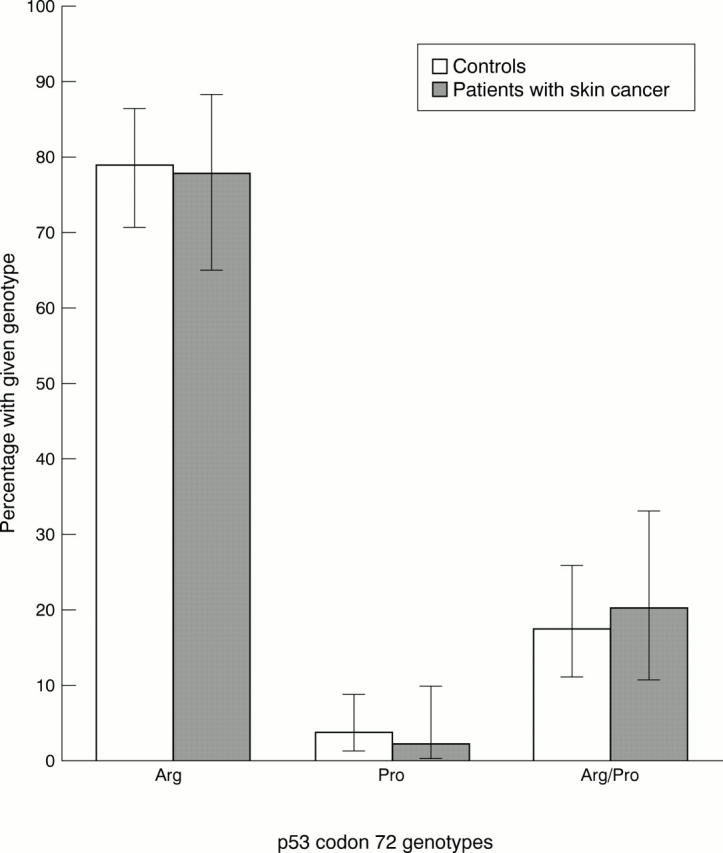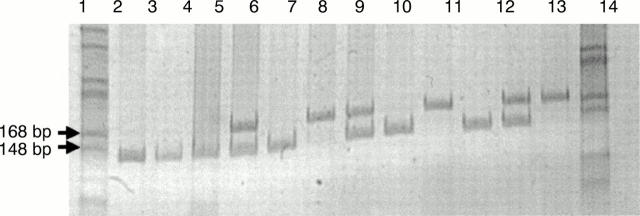Abstract
Background/Aims—Non-melanoma skin cancers frequently harbour multiple human papillomavirus (HPV) types. A recent report suggests that a polymorphism of the p53 tumour suppressor gene that results in the substitution of a proline residue with an arginine residue at position 72 of the p53 protein might act as a risk factor in HPV associated malignancies. This study aimed to determine the following: (1) the relation between HPV infection and the development of cutaneous squamous cell carcinoma (SCC), and (2) whether there is a correlation between p53 codon 72 polymorphism and the development of SCC.
Methods—Blood samples were taken from 55 patients with skin cancer (both renal transplant recipients and immunocompetent patients with skin cancer) and 115 ethnically matched volunteers. A polymerase chain reaction based assay was used to determine p53 codon 72 genotypes. In addition, 49 benign and malignant lesions from 34 of the patients with skin cancer and 20 normal human skin samples from 20 of the control volunteers were examined for HPV.
Results—The proportions of p53 codon 72 genotypes found were 78% arginine homozygous, 2% proline homozygous, and 20% heterozygous among patients with skin cancer and 79% arginine homozygous, 3.5% proline homozygous, and 17.5% heterozygous among the control population. Statistical analysis showed no significant differences in the distribution of the two p53 isoforms between the patients with skin cancer and the control population. The predominant viral types detected in both the patients and the control group were EV associated HPVs, although the incidence was lower in normal skin samples than in malignant lesions or viral warts.
Conclusions—These results suggest that in a Celtic population there is no correlation between the presence of HPV, the p53 codon 72 arginine polymorphism, and the development of skin cancer.
Key Words: p53 codon 72 polymorphism • human papillomavirus • skin cancer
Full Text
The Full Text of this article is available as a PDF (113.5 KB).
Figure 1 Sample 12% (wt/vol) acrylamide gel depicting the three p53 codon 72 genotypes detected in the patients with skin cancer and the control population. Lanes 1 and 14 contain molecular weight markers (HaeII digested pBluescript). Lanes 2, 3, 6, 9, and 11 show the single 144 bp band amplified from individuals who are arginine homozygotes for the codon 72 polymorphism. Lanes 7, 10, and 13 show the single 171 bp band amplified from the p53 gene of individuals who are proline homozygotes for the codon 72 polymorphism. Lanes 5, 8, and 12 show both the 144 bp arginine band and the 171 bp proline band amplified from the p53 gene of heterozygous individuals. The gel was stained with ethidium bromide and visualised under UV light.

Figure 2 Bar chart depicting the distribution of p53 codon 72 genotypes in patients with skin cancer and in controls. Error bars represent exact binomial 95% confidence intervals. Arg, arginine homozygotes; Pro, proline homozygotes; Arg/Pro, heterozygotes.
Selected References
These references are in PubMed. This may not be the complete list of references from this article.
- Altschul S. F., Gish W., Miller W., Myers E. W., Lipman D. J. Basic local alignment search tool. J Mol Biol. 1990 Oct 5;215(3):403–410. doi: 10.1016/S0022-2836(05)80360-2. [DOI] [PubMed] [Google Scholar]
- Beckman G., Birgander R., Själander A., Saha N., Holmberg P. A., Kivelä A., Beckman L. Is p53 polymorphism maintained by natural selection? Hum Hered. 1994 Sep-Oct;44(5):266–270. doi: 10.1159/000154228. [DOI] [PubMed] [Google Scholar]
- Berkhout R. J., Tieben L. M., Smits H. L., Bavinck J. N., Vermeer B. J., ter Schegget J. Nested PCR approach for detection and typing of epidermodysplasia verruciformis-associated human papillomavirus types in cutaneous cancers from renal transplant recipients. J Clin Microbiol. 1995 Mar;33(3):690–695. doi: 10.1128/jcm.33.3.690-695.1995. [DOI] [PMC free article] [PubMed] [Google Scholar]
- Boxman I. L., Berkhout R. J., Mulder L. H., Wolkers M. C., Bouwes Bavinck J. N., Vermeer B. J., ter Schegget J. Detection of human papillomavirus DNA in plucked hairs from renal transplant recipients and healthy volunteers. J Invest Dermatol. 1997 May;108(5):712–715. doi: 10.1111/1523-1747.ep12292090. [DOI] [PubMed] [Google Scholar]
- Buller R. E., Sood A., Fullenkamp C., Sorosky J., Powills K., Anderson B. The influence of the p53 codon 72 polymorphism on ovarian carcinogenesis and prognosis. Cancer Gene Ther. 1997 Jul-Aug;4(4):239–245. [PubMed] [Google Scholar]
- Dokianakis D. N., Koumantaki E., Billiri K., Spandidos D. A. P53 codon 72 polymorphism as a risk factor in the development of HPV-associated non-melanoma skin cancers in immunocompetent hosts. Int J Mol Med. 2000 Apr;5(4):405–409. doi: 10.3892/ijmm.5.4.405. [DOI] [PubMed] [Google Scholar]
- Jin X., Wu X., Roth J. A., Amos C. I., King T. M., Branch C., Honn S. E., Spitz M. R. Higher lung cancer risk for younger African-Americans with the Pro/Pro p53 genotype. Carcinogenesis. 1995 Sep;16(9):2205–2208. doi: 10.1093/carcin/16.9.2205. [DOI] [PubMed] [Google Scholar]
- Marshall S. E., Bordea C., Wojnarowska F., Morris P. J., Welsh K. I. p53 codon 72 polymorphism and susceptibility to skin cancer after renal transplantation. Transplantation. 2000 Mar 15;69(5):994–996. doi: 10.1097/00007890-200003150-00056. [DOI] [PubMed] [Google Scholar]
- Matlashewski G. J., Tuck S., Pim D., Lamb P., Schneider J., Crawford L. V. Primary structure polymorphism at amino acid residue 72 of human p53. Mol Cell Biol. 1987 Feb;7(2):961–963. doi: 10.1128/mcb.7.2.961. [DOI] [PMC free article] [PubMed] [Google Scholar]
- Minaguchi T., Kanamori Y., Matsushima M., Yoshikawa H., Taketani Y., Nakamura Y. No evidence of correlation between polymorphism at codon 72 of p53 and risk of cervical cancer in Japanese patients with human papillomavirus 16/18 infection. Cancer Res. 1998 Oct 15;58(20):4585–4586. [PubMed] [Google Scholar]
- Ngan H. Y., Liu V. W., Liu S. S. Risk of cervical cancer is not increased in Chinese carrying homozygous arginine at codon 72 of p53. Br J Cancer. 1999 Aug;80(11):1828–1829. doi: 10.1038/sj.bjc.6690606. [DOI] [PMC free article] [PubMed] [Google Scholar]
- Rosenthal A. N., Ryan A., Al-Jehani R. M., Storey A., Harwood C. A., Jacobs I. J. p53 codon 72 polymorphism and risk of cervical cancer in UK. Lancet. 1998 Sep 12;352(9131):871–872. doi: 10.1016/S0140-6736(98)07357-7. [DOI] [PubMed] [Google Scholar]
- Shamanin V., zur Hausen H., Lavergne D., Proby C. M., Leigh I. M., Neumann C., Hamm H., Goos M., Haustein U. F., Jung E. G. Human papillomavirus infections in nonmelanoma skin cancers from renal transplant recipients and nonimmunosuppressed patients. J Natl Cancer Inst. 1996 Jun 19;88(12):802–811. doi: 10.1093/jnci/88.12.802. [DOI] [PubMed] [Google Scholar]
- Själander A., Birgander R., Hallmans G., Cajander S., Lenner P., Athlin L., Beckman G., Beckman L. p53 polymorphisms and haplotypes in breast cancer. Carcinogenesis. 1996 Jun;17(6):1313–1316. doi: 10.1093/carcin/17.6.1313. [DOI] [PubMed] [Google Scholar]
- Sonoda Y., Saigo P. E., Boyd J. p53 and genetic susceptibility to cervical cancer. J Natl Cancer Inst. 1999 Mar 17;91(6):557–557. doi: 10.1093/jnci/91.6.557. [DOI] [PubMed] [Google Scholar]
- Sorensen D. M., Lewark T. M., Haney J. L., Meyers A. D., Krause G., Franklin W. A. Absence of p53 mutations in squamous carcinomas of the tongue in nonsmoking and nondrinking patients younger than 40 years. Arch Otolaryngol Head Neck Surg. 1997 May;123(5):503–506. doi: 10.1001/archotol.1997.01900050051006. [DOI] [PubMed] [Google Scholar]
- Storey A., Thomas M., Kalita A., Harwood C., Gardiol D., Mantovani F., Breuer J., Leigh I. M., Matlashewski G., Banks L. Role of a p53 polymorphism in the development of human papillomavirus-associated cancer. Nature. 1998 May 21;393(6682):229–234. doi: 10.1038/30400. [DOI] [PubMed] [Google Scholar]
- Surentheran T., Harwood C. A., Spink P. J., Sinclair A. L., Leigh I. M., Proby C. M., McGregor J. M., Breuer J. Detection and typing of human papillomaviruses in mucosal and cutaneous biopsies from immunosuppressed and immunocompetent patients and patients with epidermodysplasia verruciformis: a unified diagnostic approach. J Clin Pathol. 1998 Aug;51(8):606–610. doi: 10.1136/jcp.51.8.606. [DOI] [PMC free article] [PubMed] [Google Scholar]
- Wang Y. C., Lee H. S., Chen S. K., Chang Y. Y., Chen C. Y. Prognostic significance of p53 codon 72 polymorphism in lung carcinomas. Eur J Cancer. 1999 Feb;35(2):226–230. doi: 10.1016/s0959-8049(98)00369-4. [DOI] [PubMed] [Google Scholar]
- Yamashita T., Yaginuma Y., Saitoh Y., Kawai K., Kurakane T., Hayashi H., Ishikawa M. Codon 72 polymorphism of p53 as a risk factor for patients with human papillomavirus-associated squamous intraepithelial lesions and invasive cancer of the uterine cervix. Carcinogenesis. 1999 Sep;20(9):1733–1736. doi: 10.1093/carcin/20.9.1733. [DOI] [PubMed] [Google Scholar]
- Zehbe I., Voglino G., Wilander E., Genta F., Tommasino M. Codon 72 polymorphism of p53 and its association with cervical cancer. Lancet. 1999 Jul 17;354(9174):218–219. doi: 10.1016/S0140-6736(99)01914-5. [DOI] [PubMed] [Google Scholar]
- de Villiers E. M., Lavergne D., McLaren K., Benton E. C. Prevailing papillomavirus types in non-melanoma carcinomas of the skin in renal allograft recipients. Int J Cancer. 1997 Nov 4;73(3):356–361. doi: 10.1002/(sici)1097-0215(19971104)73:3<356::aid-ijc9>3.0.co;2-z. [DOI] [PubMed] [Google Scholar]
- van Duin M., Snijders P. J., Vossen M. T., Klaassen E., Voorhorst F., Verheijen R. H., Helmerhorst T. J., Meijer C. J., Walboomers J. M. Analysis of human papillomavirus type 16 E6 variants in relation to p53 codon 72 polymorphism genotypes in cervical carcinogenesis. J Gen Virol. 2000 Feb;81(Pt 2):317–325. doi: 10.1099/0022-1317-81-2-317. [DOI] [PubMed] [Google Scholar]



